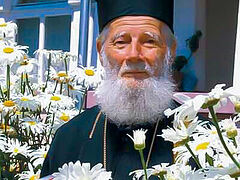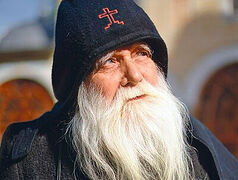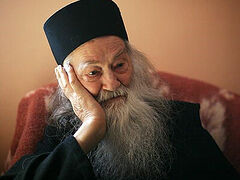On July 19, 2011, at the age of ninety-six, the Romanian elder Archimandrite Arsenie (Papacioc) reposed in his cell at Techirghiol Monastery.
The mountain and the mouse
 The arrested Hieromonk Arsenie (Papacioc), 1958
The arrested Hieromonk Arsenie (Papacioc), 1958
“I was arrested at Slatina Monastery at 2:00 in the morning, when I was leaving church after a service. Three trucks, two cars, and eighty-nine officers. I told them: ‘The mountain was assailed, and out came a mouse.’”
It was the night of June 13-14, 1958. The monastery brotherhood was to be beheaded by the arrest of the abbot Fr. Cleopa and the igumen Fr. Arsenie, but Fr. Cleopa managed to escape into the forest at the last minute, where he then hid for years. And the time had come for his spiritual son to experience a new form of asceticism: All the hardship up to this point, the experience of prison in his youth, the years of prayer and monastic service, the time spent in eremitism—all of it had to be laid at the feet of Christ, as the supreme sacrifice for the entire Romanian people.
Fr. Arsenie was aware of all of this:
“The desert and prison are treasures that can bring you great benefits, if you’re clever. The nation lives by those who ascend to Heaven; that is, those who are struggling, who are always hanging on the cross, without making any concessions.”
What was he charged with? Participating in the meetings of the Burning Bush, that wonderful spiritual movement that was founded in the Bucharest Antim Monastery by the monk-poet Daniil Sandu Tudor together with a group of Bucharest intellectuals. They were charged with an attempt to overthrow the regime, although they fought only with their passions, trying to enlighten and perfect themselves, practicing the Jesus Prayer under the guidance of Fr. John (Kuligin) from Russia. When he was arrested, Fr. Arsenie told his fellow laborers at Slatina:
“I was a Legionnaire, but now I’m a monk, beyond everything. And I have no other ideal than to die for the spark of Truth that I carry within me.”
However, Christ did not ordain for him to die in prison. He was tortured for months in terrible interrogations. The torture was planned so as to break the prisoner’s soul: nights without sleep, punctuated by beatings and clashes with those who betrayed him, either out of fear or the inability to withstand the torment. Fr. Arsenie went through all of this. However, his dossier in the Securitate testifies that he didn’t say anything about anyone, but he was slandered by those who couldn’t withstand the torture.
As the years passed by, he would say that nothing in his life brought him so much benefit as did his experience in prison. There, in the dark and suffocating dungeons that turned into scorching furnaces in the summer and were covered in ice in the winter, the great spiritual fathers of this people were formed. All the great lights of Orthodoxy in the twentieth century passed through the communist prisons: Dumitru Stăniloae, Constantin Galeriu, Benedict Ghiuș, Daniil Tudor, Roman Braga, Sofian Boghiu, and many others made the prison walls translucent, allowing the sun of faith to illuminate the darkness.
“Oh Christ, You pray for those who crucify You, and You crucify those who love You!”—this terrible “alchemy” was also at play in the communist prisons. All the hatred, all the sin thrown into the world by the communist beast was distilled through the tormented bodies of several thousands of prisoners.
“It was very hard for me to endure prison. But it’s also difficult to express how much I benefited from it. There were sufferings that exceeded our strength. We turned into skeletons. We’d spit our teeth out into our hands and throw them on the floor. I’ve never seen such people in all my life—just skin and bones. But most of all, I was shocked by my cellmate, who after so many tortures couldn’t even remember his wife’s name. I wept tears of pity for him and the others, but I tried to encourage and strengthen them, hearing their confessions.”
I think it was there in the prisons of Aiud and Jilava that Father’s heart was inseparably united with Christ. Prison meant for him inner maturity, complete love, pure compassion, the deepest prayer. Every time he spoke about it, something awakened in his soul. It wasn’t easy for him to recall everything that happened there, but when he did it, his back, bent by the years and prostrations, would straighten up, his eyes would begin to burn, and tears would well up.
“They often threw me in the ‘freezer’—a chamber that wasn’t heated in the winter, with ice on the floor. It was really very difficult to survive there, and people died. They wanted to destroy me too, but apparently my heart was a little stronger. The Lord showed me extraordinary consolations there, which it’s very hard to talk about. Someone asked me whether there were any miracles in prison. I said that the greatest miracle was that not a single miracle happened there.”
“Love and trust in God”
Darkness has a border, and evil has an end—not because people are good, and not because God intervened to stop wickedness, but because only love and light are limitless, omnipotent. This is how it happened that the prisons that devoured the best Romanians eventually let them go—living skeletons, mutilated bodies, but ignited by the Spirit, they came back to life. Just as no one knew when they were imprisoned, so no one noticed when they returned; but little by little the message was heard again. They hadn’t been in prison, but the whole country was a gulag that you could escape from only if you had wings. Fr. Arsenie was one of those who helped us realize that we are free and that man’s main work is to fly to God.
After being released from prison in 1964, Father wandered from parish to parish until Patriarch Justinian appointed him to Techirghiol. Father spent his whole life in this small monastery, resembling a chest with relics. First of all, he began to hear confessions. He spoke simply and directly, heart to heart.
 The Church of the Dormition of the Most Holy Theotokos at Techirghiol Monastery, seventeenth century
The Church of the Dormition of the Most Holy Theotokos at Techirghiol Monastery, seventeenth century
He was an unrivaled spiritual father for nuns all across the country. With his exceptional sensitivity and love for the beautiful, he sensed the enormous potential that women have in the Church:
“They have been neglected, unappreciated by the human mentality, and this is a huge mistake. Woman is a creation of God, completely superior. And the proof of this is the Mother of God! Women are endowed with tremendous power to love, and that’s why I admire them so much. The churches are full of women, not men!”
Father’s optimism knew no bounds. He would tell his disciples that a measure of holiness could be achieved in a day, because “in matters of salvation, there is no time—there is only eternity. Every moment can be time, and every sigh can be a prayer.”
“In the end, the devil has no power—he is tolerated! Nothing is lost as long as the soul does not abdicate, the head rises again, and faith stands on its feet. Love and trust in God.”
The battles fought within himself, in prison and in the desert, were now bearing fruit. The finale of these battles was a hymn to the conquering light, a shout of joy in the face of despair. 1989 was a revelation for Father. He saw in the youth who were sacrificing themselves at that time a continuation of the battle of his generation, which opposed communism with all its might. That is why he called the December uprising, “a revolution full of grace. Because the young people did not fight with any weapons, not with a scythe, not with axes, but with open chests, to show the faith in God in their hearts. I have great admiration for their extraordinary self-sacrifice, even until death!”
Fr. Arsenie was always very close to the hearts of young people. His radiance, his inner joy, and especially the hope he instilled made him more sought after by the youth than by the elderly. I think that’s what he wanted all his life—to help, encourage, nurture, and be with the youth, to watch over their flight:
“Did you know that a seed is bigger than a mountain? Because a mountain can only diminish, whereas a seed can become bigger than itself.”
In six more months, Fr. Arsenie would have turned ninety-seven. He already died and resurrected so many times that I’m certain that his heart has long been in the Heavenly Kingdom, surrounded by an ocean of light and love of Christ. Only his body remains on earth—a witness to the suffering and victory of the Cross over all the trials he encountered through his rather difficult life. Therefore, I think that Fr. Arsenie can no longer die. Death sought him out too many times—and in the end, it realized that it had nothing to take from him. And in its wake remains only life—life eternal.





